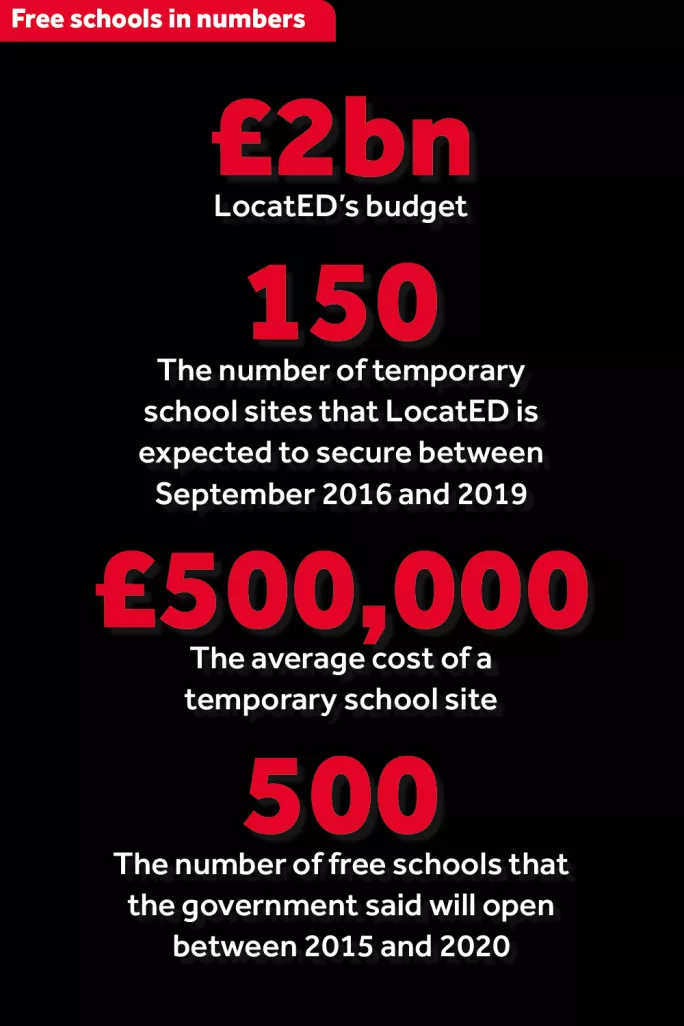‘Scandal’ of £75m ‘wasted’ on temporary free schools

Six years on from the first free school opening, the controversial policy is here to stay, with hundreds more planned. But new and worrying issues are emerging about where they will be housed.
The government is ploughing billions of pounds into the flagship programme, and has set up a separate company specifically to buy up hundreds of sites and buildings for the schools. However, Tes has learned that, despite the substantial investment, the Department for Education expects that 150 of the free-school sites bought by its property company, LocatED, will, by 2019, be only temporary.
This would mean tens of millions of pounds of taxpayers’ money being spent on short-term solutions for schools. The chairman of Parliament’s public spending watchdog describes the situation as a “scandal”.
Government papers also reveal that other free schools could be built alongside retail parks and leisure developments, sparking fears that the needs of schools will come second to the commercial interests of developers.
Rising reliance on temporary sites
The projected number of temporary school buildings comes despite the DfE’s business case for LocatED stating that “reducing the need for temporary accommodation” for free schools was a key driver behind setting up the company.
The 133-page document, obtained under the Freedom of Information Act, says that temporary sites will make up a third of the new sites needed between September 2016 and 2019 for the government to hit its target of opening 500 new free schools by 2020. This is a slightly higher proportion than the 31.9 per cent of free schools that were already operating from temporary sites, as revealed by Tes last autumn (bit.ly/TempFreeSchools).
Meg Hillier, chair of the House of Commons public accounts committee, says the latest findings highlight a serious problem.
“In 10 years’ time, this will be the next scandal,” she warns.
Her committee, along with unions, politicians and the National Audit Office (NAO), have raised concerns about the number of children attending free schools who are being taught in temporary buildings. While the concerns often focus on the effect of unsuitable school buildings on teachers and pupils, there are also financial implications. For example, a section of the business-case document that the DfE attempted to censor reveals that these temporary sites cost on average about £500,000 - suggesting that £75 million will be spent on buildings that will only ever be a short-term solution.
‘Outrageous waste of funds’
Shadow education secretary Angela Rayner says the findings call into question whether LocatED provides value for its £2bn budget.
She says: “On one hand, we keep being told that there’s not enough money, but on the other, the DfE seems content to throw millions at a project that won’t even be fulfilling its job properly. This is an outrageous waste of funds that should be going into frontline teaching.
“The Tories appear content to allow children to learn in unsuitable temporary classrooms, which is disrupting education and threatening school standards.”
Mary Bousted, joint general secretary of the NEU teaching union, also believes that the findings raise questions about how public money is being spent. “An agency is operating independently, but it seems that all the dangers identified by the NAO still seem to be there,” she says. “Taxpayers’ money is being spent on land that’s only temporary, deferring costs into the future very expensively. The fact that they’re spending taxpayers’ money buying temporary land just smacks of desperation.”
LocatED was contacted for comment.
The DfE argues that it is often better, or at least unavoidable, to provide a short-term solution for schools in areas that urgently need more places.
A spokesman says: “Opening schools on temporary sites is a standard practice and almost always a necessity when an area needs more school places. This is preferable to delaying a school’s opening.”

You need a Tes subscription to read this article
Subscribe now to read this article and get other subscriber-only content:
- Unlimited access to all Tes magazine content
- Exclusive subscriber-only stories
- Award-winning email newsletters
Already a subscriber? Log in
You need a subscription to read this article
Subscribe now to read this article and get other subscriber-only content, including:
- Unlimited access to all Tes magazine content
- Exclusive subscriber-only stories
- Award-winning email newsletters